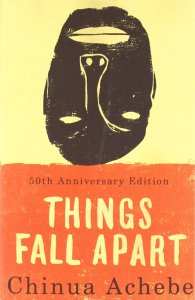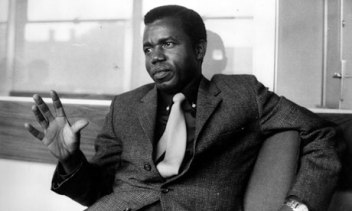 THINGS FALL APART
THINGS FALL APART
By Chinua Achebe
(Anchor Books, 209 pages)
THIS was not my first reading of the book, but my third. I read Things Fall Apart for the first time in my teens, but I admit to only skimming then. The second time I read it was in 2014. For some reason, it was a hurried read and I did not retain much of the story.
Certainly, the first time I read it, I was a very silly girl who only read white authors. My Pinterest record of the books I read in 2014 has me completing the novel on 22nd Feb. Later that year I read other African authors like Gabriel Okara, Elechi Amadi, Ken Saro-Wiwa, Chimamanda Ngozi Adichie and Sefi Atta. I believe that was the year I decided to make a big effort to read out of my comfort zone, i.e. more Asian and African authors. However, as it was early days, the part of my brain that handles reading was stuck in a rut. It still had to be kicked in the rear out of its literary ditch.
Three years on and I think I’ve succeeded in getting to a place where it’s not just stories by dead white women that make sense to me. And yes, my ‘problem’ with Things Fall Apart was that I couldn’t ‘make sense’ of it. The writing style, the content – including setting and characters – the language, nothing about it was what I was used to. Thus, I found it hard to relate to, or made no effort to try. Sure, I had read and loved Maru by Bessie Head twenty eight years before, but that was probably due to it being an A-level text, i.e. reading it maybe fifty times over, and discussing it with my tutor would have ensured that that story made complete sense.

My partner, Don, is Igbo, which is the ethnic group of the characters in Things Fall Apart (Chinua Achebe was also Igbo). I think this has made a difference to my recent reading of the book. This time round, the story seemed familiar. I recognised details from what Don has told me about Igbo cultural traditions. The way of life described was still strange, but it was easier to empathise with the characters and not completely dismiss their actions as outrageous or nonsensical.
It also helped being able to discuss the book with Don. He offered a different perspective and put things into a context I would have found it hard to imagine on my own.
The story is heartbreaking, on the level of it being the tale of a man’s downfall, and also in a larger historical and social context, as the story of the colonisation of Africa. The final sentence of the novel struck me to the core. It sums up the reality of the situation – in the novel, in history, and in race relations today.
I do like honest reviews like this! I’m looking for African, Arab and Asian authors to tackle this year and Achebe’s name appears often –would you recommend this title over others of his?
LikeLiked by 1 person
This was his first novel and the first African novel that received international attention, so I think it’s a good starting point, especially with its themes of cultural identity and colonisation. If you need any suggestions with regard Asian work, or more recent African fiction, I’d be happy to share. As for Arab, I am only familiar with Naguib Mafouz and Alaa al Aswany.
LikeLiked by 1 person
Thanks, Daphne, I may well start with this.
LikeLiked by 1 person
I’m looking forward to reading your response to it.
LikeLike
For me, it wasn’t so much style, or language, or setting, that put me off. I’m very much a character-driven reader and teen!me couldn’t relate to, or empathize with the characters in Things Fall Apart at all. (These days I appreciate unlikable characters a bit more, so I probably should try it again.) This book did stick with me, though – there are scenes I remember so vividly even now. I wish they didn’t force these on us in form 4/5.
LikeLiked by 1 person
If the teacher sucks it can spoil a book. Fortunately I had very good A level lit teachers so ended up loving all my set texts.
LikeLike